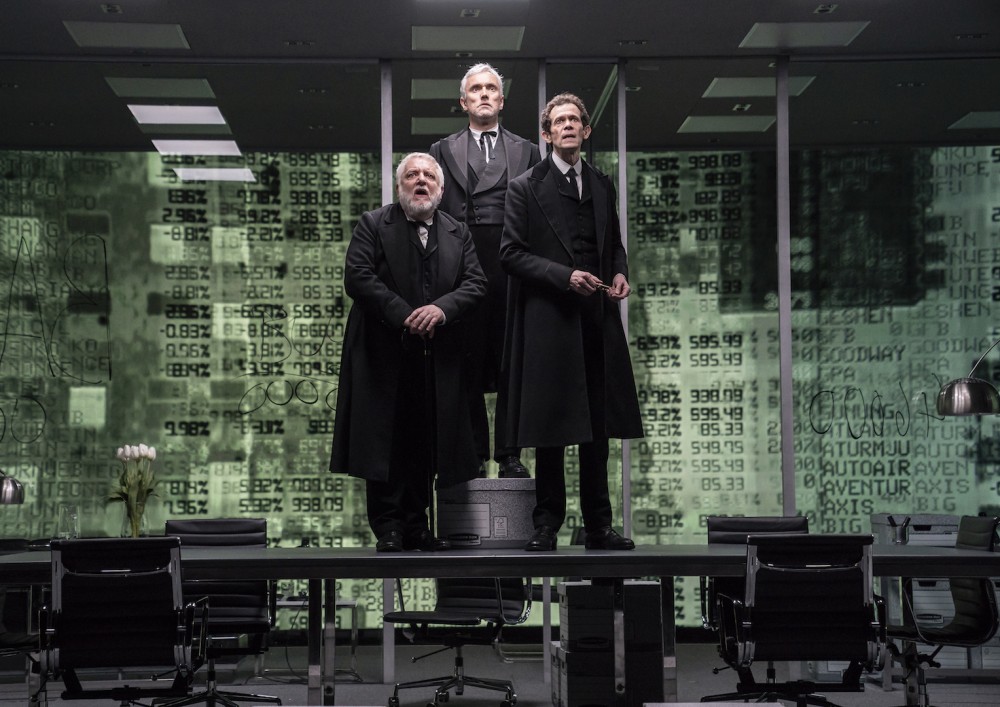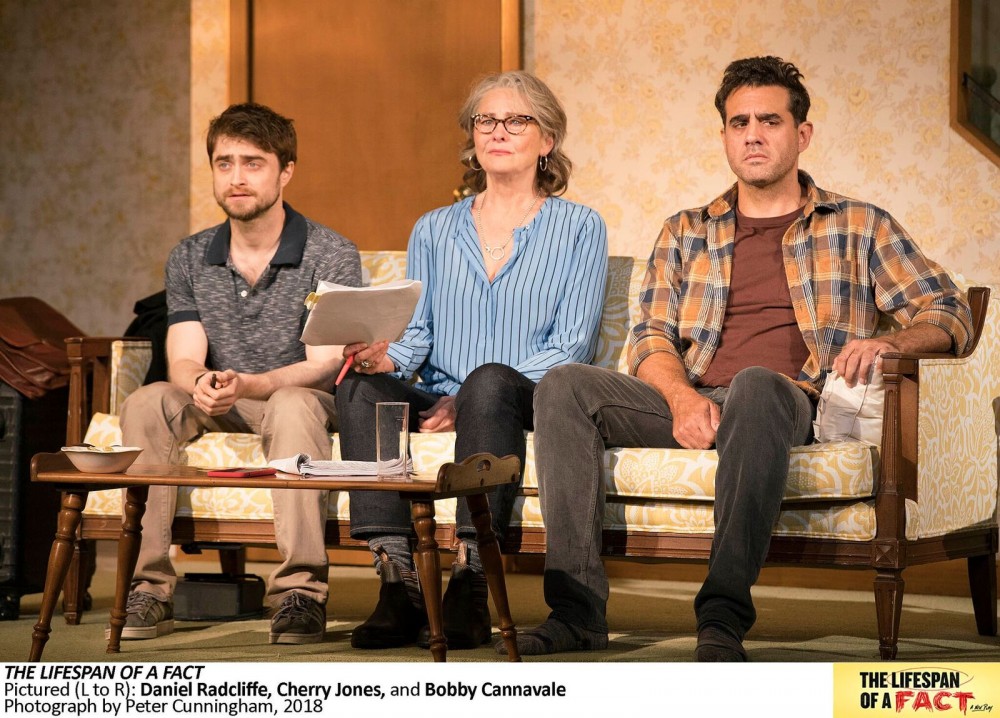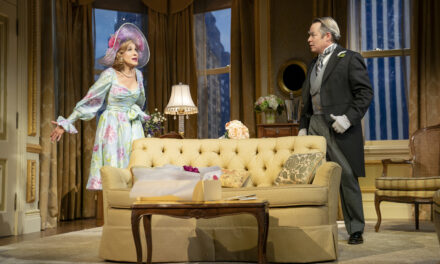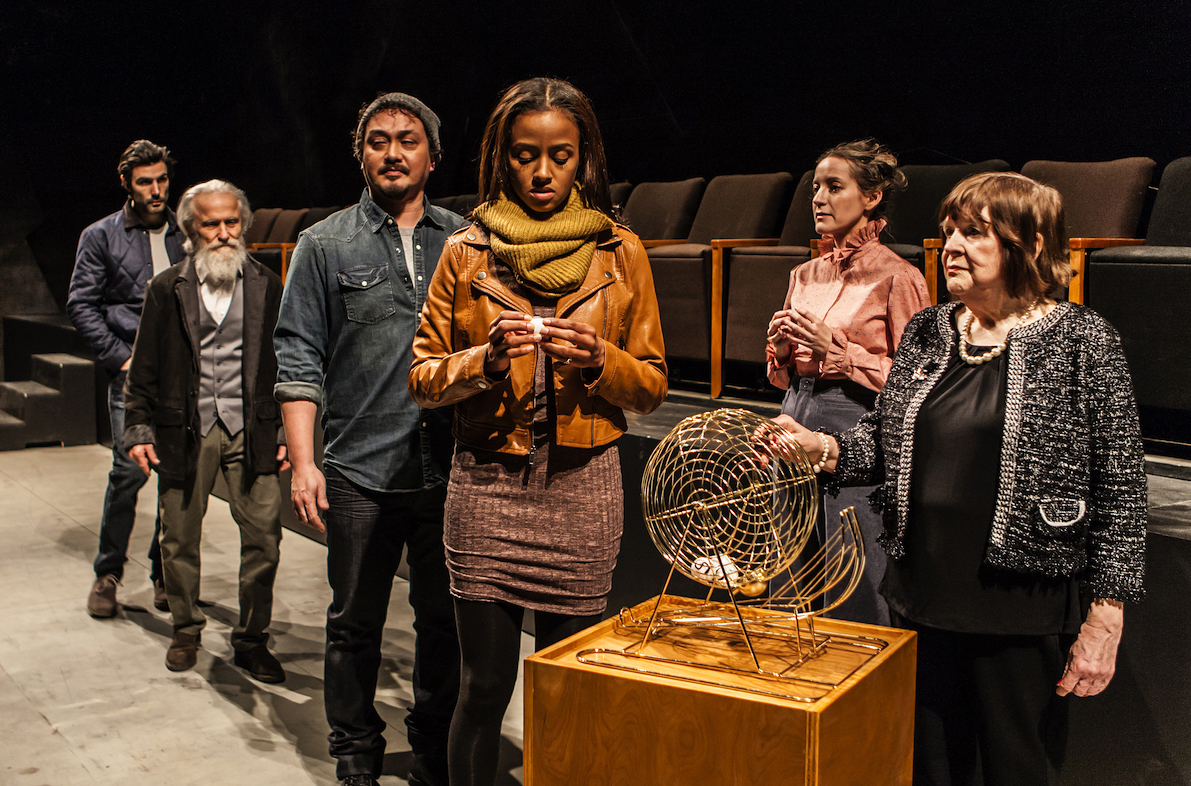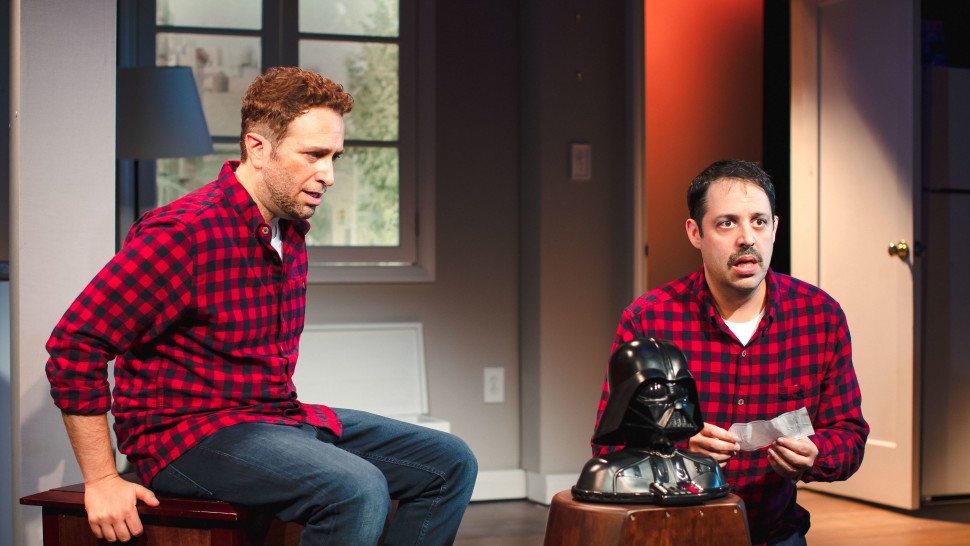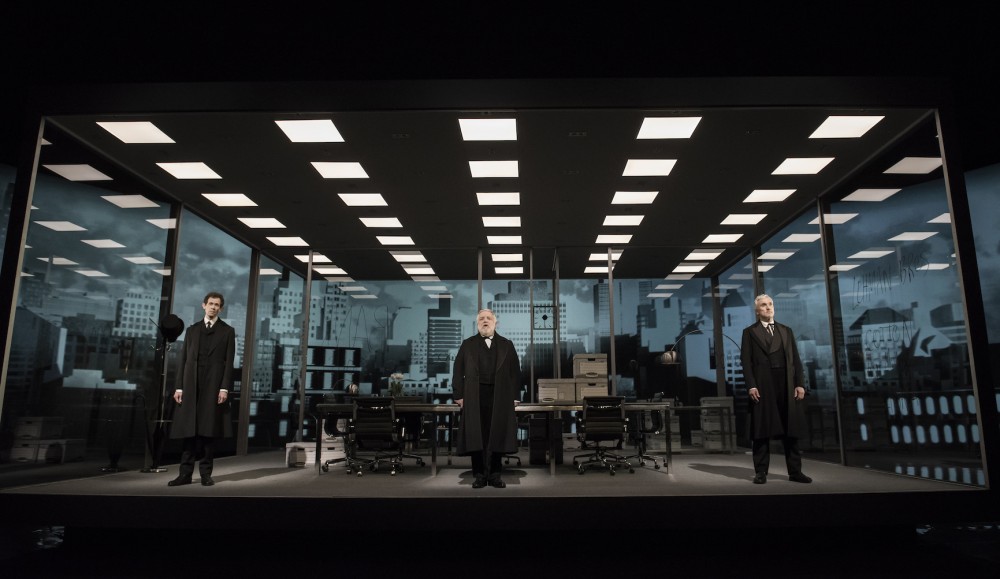
Adam Godley, Simon Russell Beale, Ben Miles
It’s a massive epic, and what masterful stagecraft is marshaled to tell it!
by Carol Rocamora
The Lehman Trilogy, the astonishing new play at the Park Avenue Armory, charts the rise and fall of Lehman Brothers, the investment banking firm. It’s an epic that sprawls over 160 years (1844-2008), telling the story of American capitalism through a single family. The narrative of three Jewish immigrant brothers and their offspring serves as a lens through which we watch American capitalism grow and thrive, achieve wonders, survive the Civil War, two World Wars and the crash of 1929—only to self-destruct in the financial debacle of 2008.
It’s a spellbinding story, but the theatrical miracle lies in how it’s told. Adaptor Ben Power has taken Stefano Massini’s sprawling play and created an adaptation specifically for this North American premiere, in collaboration with an amazing cast and creative team. Performed in Europe in previous versions with casts of dozens, Sam Mendes’s production here (from London’s National Theatre) features only three actors—Simon Russell Beale, Ben Miles, and Adam Godley—narrating the story in Brechtian fashion, playing multiple roles, switching ages, genders, and accents with virtuosic fluidity. It’s a theatrical miracle the likes of which you’ve never seen!
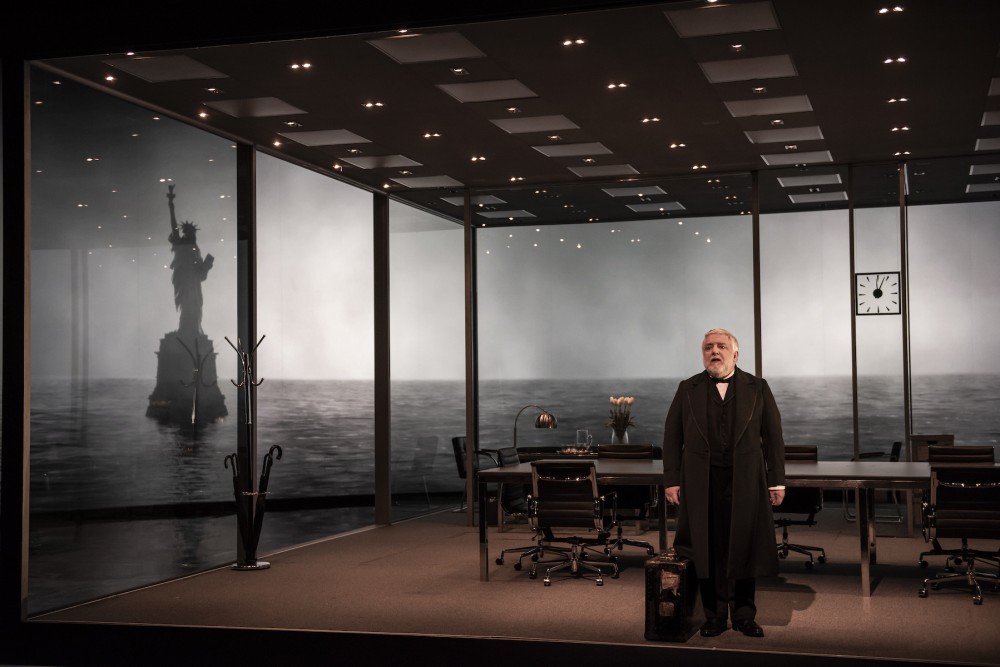

Simon Russell Beale
The story unfolds on Es Devlin’s breathtaking set, before a vast block of stadium seats in the Armory’s cavernous hall. An enormous revolving glass cube features three rooms, through which the actors navigate. Behind them on a semi-circular backdrop, Luke Hall’s stunning videos feature New York’s dramatically changing skyline, as decades pass and the story evolves. (Candida Caldicot offers live piano accompaniment, composed by Nick Powell.)
In Part I (“Three Brothers”), we meet Henry (Simon Russell Beale), the first of the Lehman family to arrive in America from Bavaria in 1844. He sets up a general store in Montgomery, Alabama, and after his younger brothers Emanuel (Ben Miles) and Mayer (Adam Godley) arrive, they expand their business to include the buying and selling of raw cotton. Surviving the Civil War, they relocate their business to the North, continuing their expansion into banking, coffee, and funding the rise of planes, trains and automobiles.
In Part II (“Fathers and Sons”), Emanuel’s son Philip and grandson “Bobbie” further expand the Lehman empire, surviving the 1929 crash, branching out into consumer capitalism (Sears, Woolworth’s, Macy’s), backing Hollywood films (King Kong and Gone With the Wind) and Broadway plays (A Streetcar Named Desire starring Marlon Brando). Two world wars pass while the business soars.
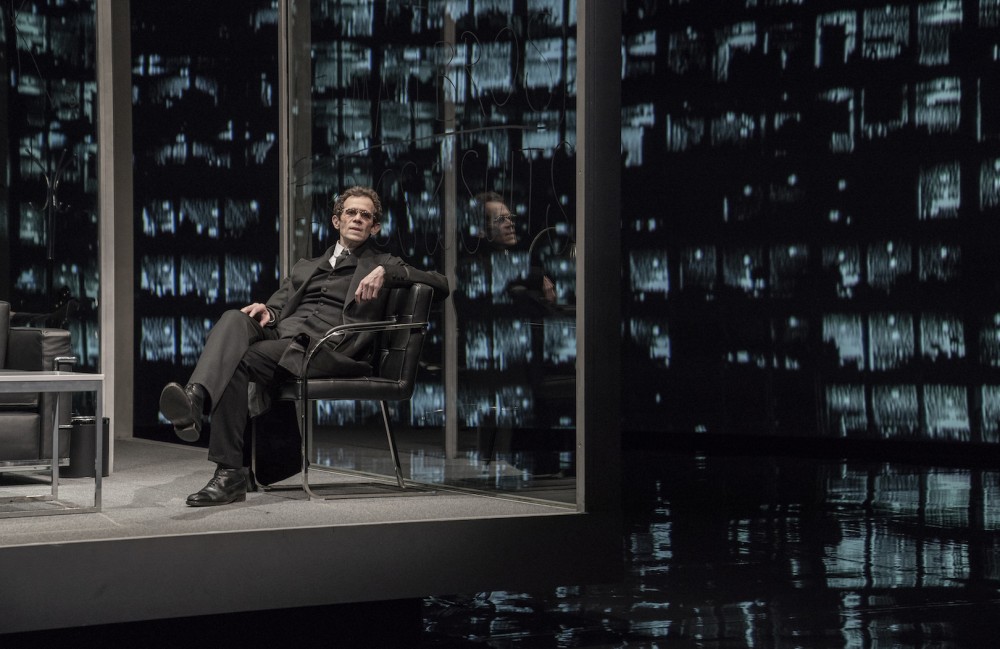

Adam Godley
With Part III (“The Immortal”), there’s a foreshadowing. With Bobbie’s death in 1969 comes the end of Lehman leadership and vision. The business develops a trading division, shifts its focus, and, under new and reckless stewardship, meets its fate in the financial collapse of 2008.
The power of The Lehman Brothers is that, like the plays of Bertolt Brecht, it’s a parable of a broader story—namely, of immigrant America, the melting pot, the mythical land of limitless opportunity. It’s also the broader view of American capitalism and New York, the city of “grabbing and greed” (according to Herbert Lehman, a family business defector who became governor of New York State). Ultimately, it’s a morality play—but one which refrains from offering an explicit moral, asking instead for the audience to draw its own conclusion.
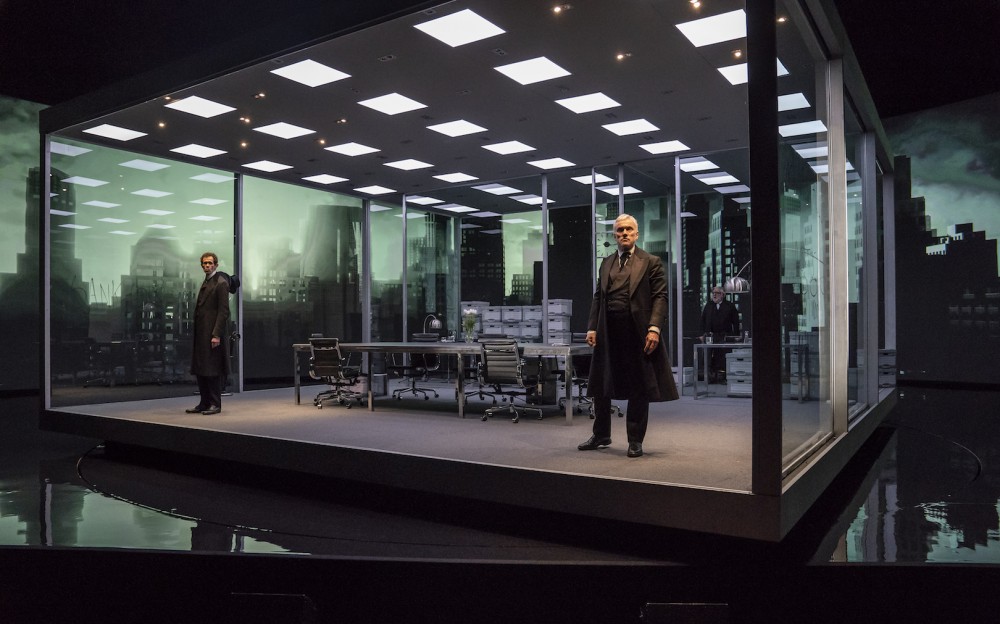

Adam Godley, Ben Miles
Meanwhile, it’s a theatrical marvel to behold. The trio offers tour de force performances—both as a flawless ensemble and as individuals. Simon Russell Beale segues seamlessly from the patriarchal Henry to a plantation manager, a maid, a child, Bobbie’s wife and even an old rabbi. Adam Godley morphs from a light-weight Mayer into a manic Bobbie, while also playing various brides and whining toddlers. Ben Miles, the middle founding brother, is an anchor of stability who later plays rebellious Lehmans of newer generations. The famed Sam Mendes (of screen and stage, most recently The Ferryman) directs brilliantly, as the cube revolves, decades pass, and the brothers and their progeny write their story with magic markers on the glass walls. In the play’s penultimate scene, the actors dance frantically, desperate to keep up with the accelerating rat race that’s about to hit the stone wall of 2008.
Underscoring this overpowering production are subtle, haunting melodies of the Lehmans’ Jewish origins—like the sad lullaby “Rozhinkes mit mandeln” played on the piano below the stage. “Baruch Hashem” (“Praise God”) is the mantra Henry repeats in the early years of the Lehmans’ meteoric rise. And finally, there’s the recitation of the Kaddish (Jewish prayer for the dead), signifying the tragic end of this family story, and a warning of others to come.
The Lehman Trilogy. Through April 20 at the Park Avenue Armory (643 Park Avenue, between East 66th and 67th Streets). Three hours, 20 minutes, including two intermissions. www.armoryonpark.org
Photos: Stephanie Berger


